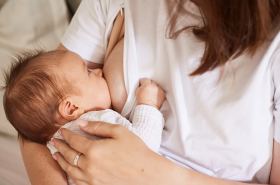
For many people, coffee is an essential part of their daily routine. But when you’re pregnant or a new parent, you may wonder how coffee affects your health and your baby’s well-being. This might lead you to ask can you drink coffee while pregnant? The short answer is – probably! So don’t panic! But there’s lots you should know. From the potential risks and benefits, to tips for moderation, we’ve got you covered.
Drinking coffee during pregnancy
One of the best bits about coffee is the caffeine! Right?! It’s a natural stimulant and while it might be the only way you can function first thing in the morning, it can also cross the placenta and affect your baby. So how much caffeine can you have when pregnant? What’s safe?
1. Caffeine Content in Coffee:
Coffee is one of the most common sources of caffeine. On average, a mug of instant coffee contains approximately 100 milligrams of caffeine. However, caffeine levels can vary widely depending on factors like the type of coffee beans and brewing method.
2. Moderation is Key:
So, how much caffeine can you have when pregnant? The consensus among healthcare professionals is that moderate caffeine consumption during pregnancy is likely safe. The NHS suggests limiting caffeine intake to 200 milligrams per day during pregnancy.
3. Potential Risks:
Excessive caffeine intake during pregnancy has been associated with an increased risk of miscarriage and preterm birth. It can also lead to lower birth weight, which may increase the risk of health issues for the baby.
4. Individual Tolerance:
It’s important to remember that individual tolerance to caffeine varies. Some pregnant individuals may be more sensitive to caffeine’s effects than others. Pay attention to how your body reacts and consult with your healthcare provider if you have concerns.
5. Hidden Sources of Caffeine:
Besides coffee, caffeine can be found in various other sources, such as green tea, soda, chocolate, and even some medications. Be mindful of your overall caffeine intake, including these hidden sources.

Drinking coffee postpartum
One universal postpartum experience for all parents is a lack of sleep. And that probably means you’ll do almost anything for some extra energy after a long night shift! But there are a few considerations to keep in mind during the postpartum period:
1. Coffee and breastfeeding/chestfeeding:
If you’re breast/chestfeeding, it’s important to remember that caffeine can pass into your milk and affect your baby. While moderate caffeine consumption is generally considered safe while breast/chestfeeding, excessive intake may cause irritability and sleep disturbances in your baby. To minimise potential issues, consider timing your coffee consumption to coincide with your baby’s feeding schedule to allow time for caffeine to clear from your system before the next feed.
2. Energy Boost:
The postpartum period can be physically and mentally exhausting. A cup of coffee can provide a much-needed energy boost, but be mindful not to overdo it. If you find yourself relying heavily on caffeine to combat sleep deprivation, it may be helpful to explore other strategies for managing fatigue, such as short naps when your baby sleeps (easier said than done we know!), staying hydrated, or exercising if your healthcare provider has given you the green light.
3. Dehydration:
Coffee is a diuretic, which means it can contribute to dehydration. This is especially important to consider when you’re postpartum and your body is recovering from childbirth. Make sure to balance your coffee consumption with adequate water intake.
4. Postpartum Depression:
Postpartum depression is a common condition that affects many new parents. Some studies have suggested that excessive caffeine consumption may increase the risk of developing postpartum depression. While the link is not entirely clear, it’s a good reason to be mindful of your caffeine intake and consult with a healthcare provider if you’re experiencing symptoms of postpartum depression.
Alternatives to Traditional Coffee
If you’re concerned about the potential risks of caffeine during pregnancy or while breast/chestfeeding, there are alternative options to consider:
1. Decaffeinated Coffee:
Drinking decaf coffee when pregnant is an alternative for those who want to enjoy the taste of coffee without the caffeine. It typically contains only a small amount of caffeine, around 2-5 milligrams per small mug.
2. Herbal Teas:
Herbal teas are mostly caffeine-free and can provide a comforting beverage option during pregnancy and while breastfeeding. Popular varieties are chamomile or fruit teas.
If herbal tea isn’t your thing, but you’re still looking for a little caffeine, Chai and Matcha are worth considering. Chai typically has about 40 mg of caffeine and matcha has about 70mg compared to the 100(ish)mg of caffeine in coffee. But beware: the spices it contains, such as ginger, cloves and cinnamon, are suspected of being able to trigger contractions. Coumarin, which is contained in cassia cinnamon, can cause liver damage in large quantities and affect blood clotting. Nutmeg contains hallucinogens, which can damage the unborn child in high doses.
3. Water:
Staying hydrated is crucial during pregnancy and the postpartum period. Opt for water as your primary beverage and consider infusing it with fruits or herbs for added flavour.
4. Limiting Caffeine-Containing Foods and Drinks:
In addition to perhaps switching to decaf coffee when pregnant, be mindful of other caffeinated foods and drinks in your diet, such as chocolate and certain medications. Reducing your overall caffeine intake can help you stay within recommended limits.
Can you drink coffee when pregnant – making an informed choice
So it seems that the answer to the question can you drink coffee when pregnant? is a little complicated but generally speaking… yes! It’s essential to exercise caution and moderation during pregnancy and the postpartum period. While moderate caffeine consumption is generally considered safe, it’s crucial to be mindful of your individual tolerance and potential risks. Consult with your healthcare provider if you have specific concerns or questions about caffeine and its effects on your pregnancy or how drinking coffee and breastfeeding/chestfeeding can work for you. Every person’s experience is unique, and making informed choices will help you prioritise your well-being and the health of your baby.
Sources: https://www.nhs.uk/pregnancy/keeping-well/foods-to-avoid/
https://www.ncbi.nlm.nih.gov/pmc/articles/PMC9983362/
Featured photo by Yan Krukau



